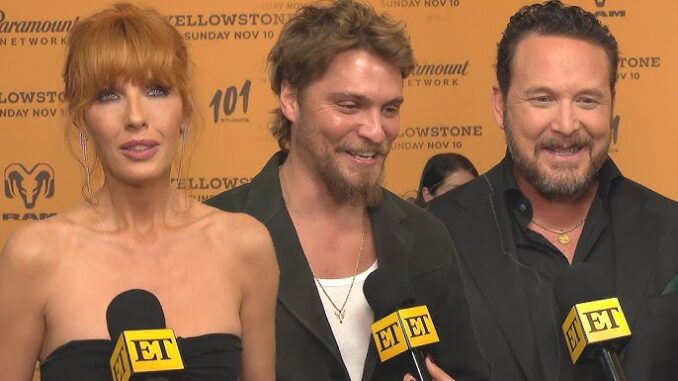
The Unseen Battle for the Yellowstone: Behind-the-Scenes Drama on the Hit Show
The sprawling vistas of Montana, the raw, brutal loyalty of the Dutton family, and the ever-present threat to their sacred ground – Yellowstone exploded onto screens, captivating millions with its potent blend of Western myth, family saga, and modern-day power struggles. It built an empire, not just for John Dutton, but for Paramount, for creator Taylor Sheridan, and for its leading man, Kevin Costner. Yet, behind the scenes of this monumental success, a different kind of drama unfolded, a tempestuous saga of creative control, shifting priorities, and a leading man's exit that mirrored the very struggles for power and legacy central to the Dutton empire, irrevocably shaping the show's final act and its enduring myth.
From its inception, Yellowstone was Taylor Sheridan's vision, a deeply personal and often uncompromising narrative borne from his unique understanding of the American West. He became known for his singular writing process, often penning entire seasons himself, and his reputation for absolute creative control. This, coupled with the show's meteoric rise, created an environment where the showrunner's word was law. Into this world stepped Kevin Costner, a cinematic icon whose very presence lent gravitas and authenticity to the role of John Dutton. Costner wasn't just an actor; he was, in many ways, the embodiment of the Western genre, a legend whose star power elevated Yellowstone from a promising cable drama to a cultural phenomenon. This inherent power dynamic, between a visionary auteur and a bona fide movie star, was always a delicate balance, much like the alliances John Dutton forged on his own ranch.
The first whispers of discord began subtly, barely audible beneath the roar of critical acclaim and booming viewership. As Yellowstone's schedule expanded, so too did Costner's ambitions. He had long harbored a passion project, a multi-part Western film epic titled Horizon: An American Saga, a deeply personal endeavor that demanded his full commitment. This is where the narrative fault lines began to appear. Reports emerged of scheduling conflicts, of Costner's desire to reduce his time on Yellowstone to accommodate Horizon, leading to alleged frustrations from Sheridan and the production team who relied on their central patriarch. The tension was palpable, playing out in cryptic social media posts, carefully worded press releases, and the conspicuous absence of the lead actor from certain promotional events.
For fans, this unfolding drama was bewildering, a destabilizing force much like the persistent threats to the Dutton ranch itself. How could the show continue without John Dutton, the stoic, beleaguered heart of the family? The very idea felt like a betrayal. Costner, for his part, maintained his commitment to the show, but also to his artistic integrity and his long-held dream of Horizon. It became a clash of titans, not just individuals, but of priorities: the momentum of a runaway hit series versus the singular vision of an artist's passion project. Was it an actor being "difficult," as some tabloids suggested, or a professional trying to balance contractual obligations with a lifelong ambition? The truth, as always, was likely far more nuanced, a complex negotiation fraught with ego, logistics, and creative differences.
Ultimately, the inevitable came to pass. The patriarch, John Dutton himself, was poised to leave the ranch, a mirror to the very real departure of Kevin Costner from the show's helm. The announcement of Yellowstone's final season and the subsequent news of Costner's exit sent shockwaves through the fandom. The show, which had thrived on its sense of unbreakable family and enduring legacy, was now facing its own internal fracture, a testament to the idea that even the most powerful empires can crumble from within.
The behind-the-scenes drama of Yellowstone serves as a fascinating, if painful, illustration of the complex alchemy that creates a hit show. It highlights the delicate balance between star power and the showrunner's singular vision, the relentless demands of a television production, and the often-unseen sacrifices and compromises made by those who bring these stories to life. Like the Dutton family fighting tooth and nail for their land, the creators and stars of Yellowstone found themselves in their own battle for control, for narrative integrity, and for their respective legacies. The dust may yet settle on the Montana plains, both on screen and off, but the turbulent currents of its making will forever remain an integral part of Yellowstone's powerful, complicated, and undeniably dramatic story.
